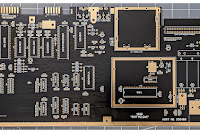
If you're attuned to social media at all, and you happen to be interested in camera hardware then it can't have failed to escape your attention that the world is going nuts for mirrorless cameras these days. This is because all the major players are now producing Full Frame mirrorless cameras which appeal to the hardcore hobbyists and pros who are willing to spend the money to own one.
However, mirrorless cameras have been around for a long time - the very first interchangeable lens mirrorless camera was released in 2004 - so this is not new technology and mirrorless technology has been in your mobile phone for years now. Also, if you think there are mirrors in your digital compact camera or bridge camera, think again - they're all mirrorless too and have been for a long time. In fact, with the exception of DSLRs, pretty much every modern camera is already mirrorless so really this shouldn't be a big deal (and in my humble opinion, it's not).
 |
| Not the recommended way of obtaining a mirrorless camera |
If you've read my article "WTF Is Phase Detection Autofocus?" you'll be up to speed on why DSLRs have mirrors and what it does with them, which, to summarise, is to allow you to see exactly what the lens sees through the viewfinder and to allow the camera to use phase detection autofocus. Now these mirrors are moving parts - these are what make the familiar click-clack sound when you take a picture with a traditional DSLR: it's the sound of the mirror moving up to reveal the sensor so that the image can be taken and then flipping down again. These mirrors take up space inside the camera body too so if we were to dispense with these it should be possible to make a smaller and quieter camera, right? Well that's pretty much the gist of it. Mirrorless camera's can be smaller than DSLRs and they are certainly quieter, however they also offer certain other advantages: the viewfinder in a mirrorless camera is electronic and is displaying what the sensor sees so changes you make to exposure etcetera, can be replicated in the viewfinder - a DSLR can't do that. The camera can also overlay information like a histogram in the viewfinder, which with a DSLR is only possible on the rear LCD. A mirrorless camera also has the potential to shoot many more frames per second than a DSLR as it doesn't need to flip a mirror out the way which could make it beneficial for those shooting sports and wildlife.
Now, because there is no mirror, there is no dedicated Phase Detect Autofocus sensor inside a mirrorless camera and so up until recently, these cameras used contrast detect, which as we discussed in the last article, is somewhat slower than phase detect. However, technology is marching on a pace and that's old news now. Phase detect sensors are now being incorporated into modern camera sensors so quick focus isn't really an issue any more. Finally, the last thing you need to be aware of with mirrorless cameras is that because the rear LCD and Electronic Viewfinder get all their information from the sensor - the sensor has to be active all the time. This is not the case with DSLRs which can "idle" the sensor when it's not in use. As a consequence, Mirrorless cameras will eat through more batteries but again, as time goes on, this will be addressed.
Now, here's my take on the whole issue, for whats it worth. DSLR cameras are dead. It's going to take a few years, but long term, they're toast. The advantages of mirrorless far outweigh the disadvantages all of which will disappear as technology improves anyway. At the moment we're starting the in-between phase which makes in kinda awkward if you're in the market for a full frame camera costing in excess of $2000 (body only) which in all honesty, most people aren't. As time goes on, the costs will fall and we'll eventually be at the stage where all brands have a full range of mirrorless cameras with various sensor sizes to fit all budgets. If that's what you want.
So, to answer the question I posed at the start of this article, should you care? Probably not. If your current camera meets your needs, then none of this matters. Technology will always be moving on. Manufacturers will always be pushing the next big thing on us. It's never going to end and we'll never get to an "everything's perfect" Nirvana. The only thing you can be virtually assured of, is that they are out to gouge you for as much of you're hard earned cash as possible at every possible turn. So, when the time comes to get a new camera, don't fall for the hype, just do your research and get what's right for you at the time that's right for you. My advice is the same as ever - worry more about what really matters - subject, lighting and composition, and worry less about bloody expensive technology.
Before we part for another week, because I'm sick to the back teeth of always having to specify whether I'm referring to a DSLR or a Mirrorless camera, from now on I'm just going to refer to ILC (Interchangeable Lens Camera) which is the officially recognised way of referring to both types of camera anyway and will save me from much annoyance.



